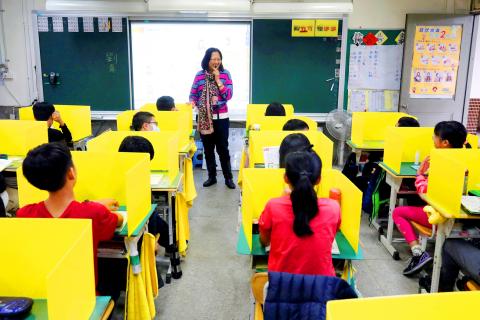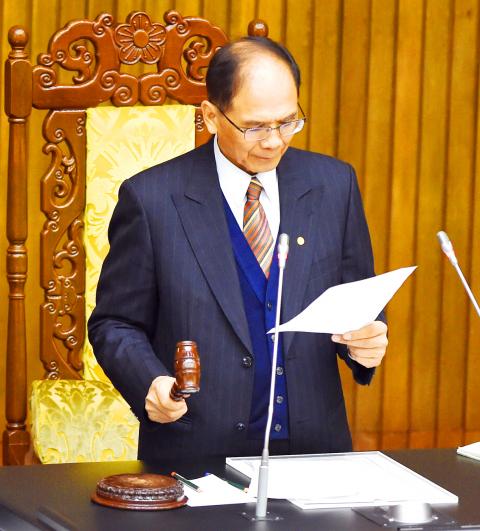Lawmakers yesterday approved a NT$60 billion (US$1.99 billion) special budget to fund disease prevention efforts, as well as bail out and support sectors affected by the COVID-19 pandemic.
The budget, planned according to the Special Act on COVID-19 Prevention, Relief and Recovery (嚴重特殊傳染性肺炎防治及紓困振興特別條例), was passed unanimously in its entirety just 16 days after it was unveiled.
The Legislative Yuan had earlier this month held three joint committee reviews, during which lawmakers agreed to leave the budget intact based on a consensus that disease prevention is the top priority.

Photo: Ann Wang, Reuters
The Ministry of Economic Affairs is to receive the lion’s share of the budget, NT$20.49 billion, which is to cover guarantees for small and medium-sized enterprises that need to take out loans, subsidized loans and coupons redeemable at stores, restaurants and beverage shops, traditional and night markets, and shopping districts.
It is also to use the funds to pay for the expropriation of mask production machinery and the development of new screening kits, support manufacturers developing new technologies and facilitate companies’ efforts to boost their exports.
The Ministry of Health and Welfare would receive NT$16.96 billion, which would go toward the research and development of drugs and vaccines targeting COVID-19; isolation and hospitalization of COVID-19 patients at designated facilities; compensation for medical personnel stationed at quarantine sites, quarantined people and those taking care of quarantined family members; and the procurement of kits, equipment and consumables to test for the novel coronavirus.

Photo: Chien Jung-fong, Taipei Times
The Ministry of Transportation and Communications is to receive NT$16.77 billion, which is to be used to bail out operators in the transportation and tourism industries that have been significantly affected by the pandemic, as well as to improve tourist destinations in preparation for plans to attract international tourists after the disease is under control.
The Council of Agriculture is to receive NT$3.56 billion to fund efforts to increase exports of produce, seafood and meat products, as well as to subsidize farmers and fishers.
The Ministry of Culture is to receive NT$800 million, which would be used to support cultural and arts venues, offer discounts when people shop at such venues and hold events to revitalize the arts and cultural sectors.
The budget is not bound by Articles 62 and 63 of the Budget Act (預算法), meaning that the funding can be transferred among agencies.
However, a resolution passed during cross-caucus negotiations on Thursday says that if an interdepartmental transfer of funds would exceed NT$50 million, the concerned agencies should first notify the legislature of the transfer.
Speaking after the passage of the budget, Democratic Progressive Party Legislator Chuang Jui-hsiung (莊瑞雄) thanked lawmakers across party lines for the swift review of the budget and the flexibility given to the agencies to use the funds.
He expressed gratitude to medical personnel who are on the front line in the fight against the virus, saying he hoped that the budget would lessen their burden as they safeguard public health.
Chinese Nationalist Party (KMT) Legislator Johnny Chiang (江啟臣) said that while not all agencies had rendered a report on the effects COVID-19 would have on the industries under their jurisdiction, lawmakers gave them the budgets that they had requested.

CHAOS: Iranians took to the streets playing celebratory music after reports of Khamenei’s death on Saturday, while mourners also gathered in Tehran yesterday Iranian Supreme Leader Ayatollah Ali Khamenei was killed in a major attack on Iran launched by Israel and the US, throwing the future of the Islamic republic into doubt and raising the risk of regional instability. Iranian state television and the state-run IRNA news agency announced the 86-year-old’s death early yesterday. US President Donald Trump said it gave Iranians their “greatest chance” to “take back” their country. The announcements came after a joint US and Israeli aerial bombardment that targeted Iranian military and governmental sites. Trump said the “heavy and pinpoint bombing” would continue through the week or as long

TRUST: The KMT said it respected the US’ timing and considerations, and hoped it would continue to honor its commitments to helping Taiwan bolster its defenses and deterrence US President Donald Trump is delaying a multibillion-dollar arms sale to Taiwan to ensure his visit to Beijing is successful, a New York Times report said. The weapons sales package has stalled in the US Department of State, the report said, citing US officials it did not identify. The White House has told agencies not to push forward ahead of Trump’s meeting with Chinese President Xi Jinping (習近平), it said. The two last month held a phone call to discuss trade and geopolitical flashpoints ahead of the summit. Xi raised the Taiwan issue and urged the US to handle arms sales to

BIG SPENDERS: Foreign investors bought the most Taiwan equities since 2005, signaling confidence that an AI boom would continue to benefit chipmakers Taiwan Semiconductor Manufacturing Co’s (TSMC, 台積電) market capitalization swelled to US$2 trillion for the first time following a 4.25 percent rally in its American depositary receipts (ADR) overnight, putting the world’s biggest contract chipmaker sixth on the list of the world’s biggest companies by market capitalization, just behind Amazon.com Inc. The site CompaniesMarketcap.com ranked TSMC ahead of Saudi Aramco and Meta Platforms Inc. The Taiwanese company’s ADRs on Tuesday surged to US$385.75 on the New York Stock Exchange, as strong demand for artificial intelligence (AI) applications led to chip supply constraints and boost revenue growth to record-breaking levels. Each TSMC ADR represents

Pro-democracy media tycoon Jimmy Lai’s (黎智英) fraud conviction and prison sentence were yesterday overturned by a Hong Kong court, in a surprise legal decision that comes soon after Lai was jailed for 20 years on a separate national security charge. Judges Jeremy Poon (潘兆初), Anthea Pang (彭寶琴) and Derek Pang (彭偉昌) said in the judgement that they allowed the appeal from Lai, and another defendant in the case, to proceed, as a lower court judge had “erred.” “The Court of Appeal gave them leave to appeal against their conviction, allowed their appeals, quashed the convictions and set aside the sentences,” the judges